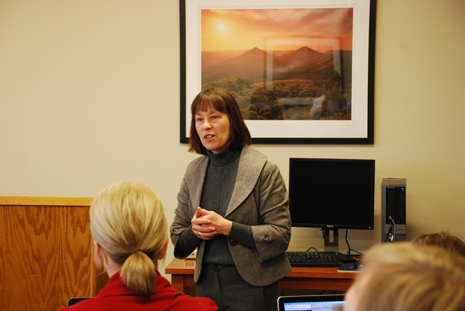Public Need For Healthy Food Should Drive Agricultural Law and Policy

Susan Schneider is director of the law school’s master’s program in agricultural and food law, the only advanced legal degree program in either agricultural or food law in the United States.
FAYETTEVILLE, Ark. – University of Arkansas law professor Susan Schneider argues that U.S. agricultural law and policy should focus on the sustainable production and delivery of healthy food to consumers rather than solely assuring the economic vitality of the agricultural industry.
“We’ve got it backwards,” Schneider says. “Farm policy is driving food policy. Farmers are encouraged to farm in ways that are not sustainable, producing crops that may not even be good for consumers. The time has come for agricultural-law policy makers to reconsider the direction of agricultural policy and to develop a food-focused agricultural law that is based on the sustainable production of healthy food.”
To achieve this objective, Schneider says, farms deserve special protection and treatment because they provide the most basic of human needs, and the federal government wants to ensure that Americans have sufficient food. However, agricultural law and policy should not focus only on the economic vitality of the agricultural industry. A new, food-based agricultural law, Schneider says, should return to an agrarianism that reconciles the self-interest of farmers with the public good of society.
“In this country, there is a long history of what is called ‘agricultural exceptionalism,’ which simply means that the agricultural industry has received special protection,” Schneider says. “And there are good reasons for this protection, because the federal government has a vested interest in helping an industry that is responsible for feeding citizens. But the problem is that as agriculture has changed over the past 50 or 60 years, these special rules and exceptions have led to a policy that mostly favors special interests within the industry, with little connection to the production of healthy food.”
Schneider is director of the University of Arkansas School of Law master’s program in agricultural and food law, the only advanced legal degree program in either agricultural or food law in the United States. The program defines agricultural law as “the network of law and policies that apply to the production, marketing, and sale of agricultural products, i.e., the food we eat, the natural fibers we wear, and increasingly, the bio-fuels that run our vehicles.”
In her article, “A Reconsideration of Agricultural Law: A Call for the Law of Food, Farming, and Sustainability,” which won the Professional Scholarship Award from the American Agricultural Law Association, Schneider argues for a reconsideration of the goals that support that legal network. She reviews the history of U.S. agricultural policy, which has always favored farming over other industries.
But Schneider argues that as agriculture has changed – as small farms have struggled and a smaller number of large farms have adopted industrialized models of production – much of farm policy and law has moved away from the overarching needs of society and toward the support of interest groups within the agricultural sector.
Schneider does not target any specific group, but her article includes this statistic: According to USDA data analyzed by the Environmental Working Group, ‘taxpayers sent $13.4 billion in farm subsidies to more than 1.4 million recipients in 2006,’ with none of these subsidies supporting production of fresh fruits and vegetables. Schneider says this shows that the production of healthy food has not been the basis for current agricultural policies.
Schneider supports special treatment for agriculture but not a status that necessarily exempts it from regulation. The framework of agricultural law, she argues, should be changed to support the development of an agricultural policy that promotes the economic welfare of the agricultural industry only in the context of overall societal goals.
Schneider’s article was published in the William & Mary Environmental Law & Policy Review. In 2010, she published Food, Farming, and Sustainability, a casebook for agricultural law survey courses.
At the recent American Association of Law Schools meeting in Washington, D.C., the organization’s Agricultural Law committee unanimously approved a name change for its section to Agricultural & Food Law. Schneider served on the committee, and her article contributed to the name change. Schneider has also been named to the editorial board of Agriculture and Food Security, a peer-reviewed journal published in London.
Topics
Contacts
Susan Schneider, professor
School of Law
479-575-4334,
sschneid@uark.edu
Matt McGowan, science and research communications officer
University Relations
479-575-4246,
dmcgowa@uark.edu
Headlines
PetSmart CEO J.K. Symancyk to Speak at Walton College Commencement
J.K. Symancyk is an alumnus of the Sam M. Walton College of Business and serves on the Dean’s Executive Advisory Board.
Faulkner Center, Arkansas PBS Partner to Screen Documentary 'Gospel'
The Faulkner Performing Arts Center will host a screening of Gospel, a documentary exploring the origin of Black spirituality through sermon and song, in partnership with Arkansas PBS at 7:30 p.m. Thursday, May 2.
UAPD Officers Mills and Edwards Honored With New Roles
Veterans of the U of A Police Department, Matt Mills has been promoted to assistant chief, and Crandall Edwards has been promoted to administrative captain.
Community Design Center's Greenway Urbanism Project Wins LIV Hospitality Design Award
"Greenway Urbanism" is one of six urban strategies proposed under the Framework Plan for Cherokee Village, a project that received funding through an Our Town grant from the National Endowment for the Arts.
Spring Bike Drive Refurbishes Old Bikes for New Students
All donated bikes will be given to Pedal It Forward, a local nonprofit that will refurbish your bike and return it to the U of A campus to be gifted to a student in need. Hundreds of students have already benefited.




